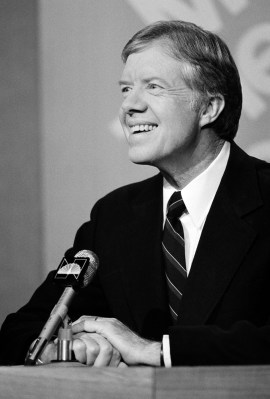Logo for the 1980 Olympics in Moscow overlaid with the word "Boycott."

Mark Wilson / AP
After the Soviet Union invaded Afghanistan in December 1979, President Carter called for a boycott of the 1980 Summer Olympics in Moscow to pressure the Soviets to pull out. It was a controversial decision. Fifty-five nations joined the boycott, leaving only 80 to compete in the Games, the lowest number of participating countries since 1956. Bert Shaw, head of the U.S. water polo national governing body, said that athletes were being held as “political hostages,” comparing them to the American embassy officials who were held hostage in Tehran. The Soviets’ war in Afghanistan continued, but there was some good news for Carter that year: the U.S. hockey team beat the Soviets 4-3 in a “Miracle on Ice” at the Winter Olympics in Lake Placid on February 22, 1980.
